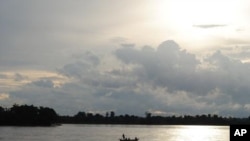Regional security experts warn that Mekong River countries must do a better job of sharing, as more and more look toward hydropower on the massive river.
Experts met in Siem Reap this weekend to discuss ways to mitigate impending conflict over the river, which is a major food source to millions of people but also a huge power supply to growing economies in the region.
Burma and China, which are considered upstream countries, need to better share information with Cambodia, Laos, Thailand and Vietnam, their downstream neighbors, experts from the Council for Security Cooperation in the Asia Pacific said.
Ellen Levin, a member of the San Francisco, Calif., Public Utilities Commission, said even in that city, people demand information about water usage.
“People want information about the inflow of our reservoir,” she said. “They want to know how we operate our reservoir. They want to know how much water we’re leaving in the river. They want to know when we're releasing the water into the river.”
“So there is more room for China to share data,” she said. That includes information on when China is releasing water from dams, she said. “We think the timing of releases is creating an impact downstream.”
China has four hydrodams in operation on the Mekong and has plans for four more. Downstream, at least 12 more dams are planned in Cambodia and Laos.
Chheang Vannarith, executive director of the Cambodian Institute for Cooperation and Peace, said such plans mean countries must work to avoid water conflicts.
“Until now, we do not yet understand China, and China is yet to understand us,” he said. “So this can create a problem, leading to conflicts between the upper and lower Mekong countries.”
Even members of the Mekong River Commission—Cambodia, Laos, Vietnam and Thailand—have limited understanding, he said.
Zhou Shichun, a Chinese representative for CSCAP, said China is working to improve cooperation with downstream countries, especially concerning reservoirs operating upstream. “So that will make a great benefit for the downstream countries,” he said. “But we would like to see that the cooperation and information-sharing is two way.”




